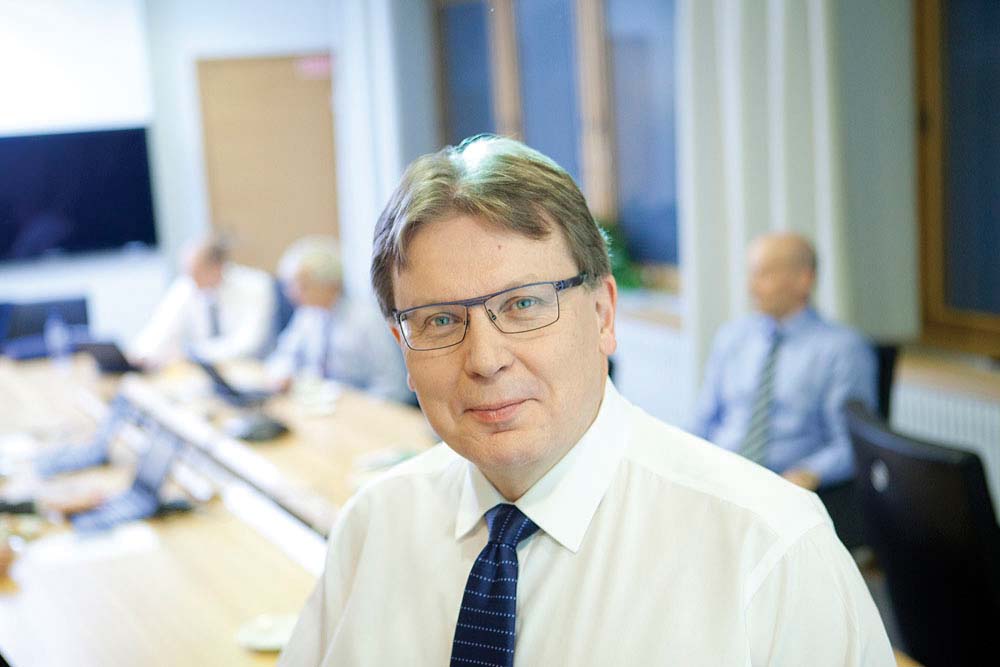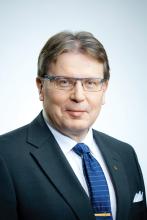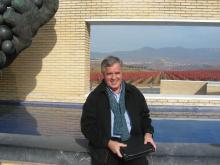
Metso CEO Matti Kähkönen talks to Aggregates Business Editor Guy Woodford about Metso’s big plans in China and other key regional markets, and the key principles fuelling the crushing and screening equipment manufacturing giant’s continued success
Asia-Pacific will continue to have the biggest world region annual demand for aggregates for the next four to five years. Within this prediction, made by many leading industry research analysts including the US-based
Given this context, the development of
“We are introducing our mobile track-mounted crushing and screening equipment to China and, through the joint venture, have access to LiuGong’s huge network of 900 dealerships,” he explains, during a business lunch at Metso’s Helsinki HQ. “We also have access to a sales and services network in China, but not of the size of LiuGong’s. The market is changing. Customers are asking for more mobile solutions. I’m very enthusiastic about the LiuGong tie-in and the rise of mobiles. Half of the world’s aggregate production takes place is in China. If you do well there [as a manufacturer], you will do very well globally.”
The initial scope of the Metso-LiuGong joint venture is covering the design and manufacture of localised versions of Metso's Lokotrack mobile crushers and screens, the first two of which were manufactured during H1 2014. The products will be sold under the dual branding LiuGong Metso.
“LiuGong is a well-established company, with global exposure, and it’s well run. They have a good equipment offering but not our technology. We have to educate the Chinese market on mobile crushers and screens. It’s not common to have them there at present,” added Kähkönen, who was keen to use Metso’s presence on LiuGong's stand at the
Metso’s joint venture with LiuGong follows the Finnish company’s acquisition last year of leading mid-market crusher and screen manufacturer
Despite Metso going into what it expects will be a highly successful joint venture with LiuGong, and the 2013 acquisition of Shaorui HI, does Kähkönen fear that Europe-based construction equipment manufacturers should fear the intense competition coming from their Chinese counterparts?
“I think in terms of process knowledge and servicing equipment, Europe is ahead of Asia. There is a second wave coming from Asia in terms of sophistication of services and technology, but they are losing, step by step, their cost advantage. To go global is not easy. We’ve been practising this [global market presence] for many years.”
Within Asia, Kähkönen believes South East Asia is another key growth market for Metso. “There are a group of developing countries including Indonesia, Malaysia, Thailand, the Philippines and Vietnam. Some of those countries’ growth is double digit numbers.” Metso already has a sales and services operation in Indonesia, and Kähkönen says he is keen to establish others in South East Asia.
As he continues his appraisal of regional markets, Kähkönen reveals how Metso has just supplied a 850 tonne primary crushing and conveying system to a mining customer in Kazakhstan – the largest mobile model ever supplied by the firm.
Metso is in the process of expanding its dealership network in North America, a construction equipment market gathering momentum, according to Kähkönen, as the overall economy continues to gain strength. In South America, Kähkönen says Metso retains a “good set-up” based on more than 20 years trading in the region.
Of the company’s presence in Africa, Kähkönen says: “Our main base on the continent is in South Africa. We’ve around 1,200 staff there. It’s a fairly massive operation. We do business in West Africa and North Africa which is covered by our Metso France subsidiary. There’s going to be much more activity in terms of building new infrastructure in certain African countries. That’s interesting us.”
Moving around the globe, Kähkönen makes an interesting comparison between the Indian and Chinese crusher markets. “Mid-sized mobile crusher models are popular in India and that’s the size of model we are promoting in China. India is some way ahead of China on mobile and portable crushers, as we introduced them there five to 10 years ago. Customers there are totally happy with them. In that respect, India’s aggregates market is pretty close to Europe.
“India has been achieving some low level growth, but there are signs with the new government that this will increase. We expect to benefit from this in the early part of next year.”
Kähkönen says that Metso’s ambitions within the Indian market continue to be aided by its “very well-established” presence at Metso Park, a 78-acre multi-functional industrial facility in Alwar, Rajasthan. The impressive site includes office premises, several workshops, warehousing, and a logistics centre. Fully operational since 2010, Metso Park brings Metso closer to its Indian customers and aids its logistics, inventory control, operational quality, productivity and supplier relationships within what is a huge country populated by around 1.2 billion people.
As an example of how Metso is close to its Indian customers, Kähkönen adds: “We get customers coming to us to ask to help them meet environmental permit requirements and to provide solutions that can operate under certain noise and dust levels. We are able to do this by coming up with more and more bespoke plants.”
While there has been a notable shift in crusher and screen customer demand for larger mobile equipment with the ability to process more tonnes/hour of material, to reduce fuel and transport costs, Kähkönen believes that the market for stationary crushers and screens remains healthy.
“If the customer plans to use it at a large quarry, then a stationary crusher and screen is very good. You cannot build a mobile crusher and screen to as high as production capacity.”
Kähkönen says that customer safety and environmentally-friendly crushing and screening are vital considerations during the development of each new Metso equipment line. “If our customers are provided with machines that consume less energy, that’s money for them. At the same time, we are reducing pollution and emissions. These factors go hand-in-hand and are big product development drivers. We also need to increase process knowledge, so that our customers can increase their productivity by using our crushers and screens to their full potential. Our aftermarket services are vital to these considerations. We need to make sure we are as close as possible to our customers.”







